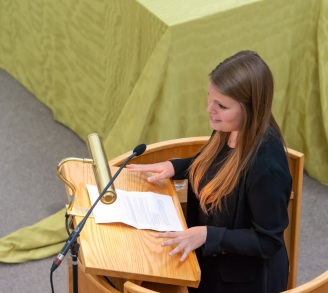Grief is a hard thing to write about, for many reasons.
For one thing, it’s a pretty intangible concept—what is it that you’re feeling when you’re grieving? “Grief” itself isn’t so much an emotion as a frame for it: a word made to weather the changeability of loss.
That’s the other problem with grief—its variability. The experience of grief differs wildly from person to person. Grief will even differ, I imagine, from loss to loss (I’m a first-timer, so I can’t confirm this theory, but it seems to me that there are too many colours of pain in the world for anyone to ever grieve the same way twice). So how are you supposed to write about it?
I can only speak for myself, and if it were me, I’d spend the first few paragraphs talking about why it’s so difficult to write about—a sort of disclaimer, to show the reader that you know that you’re not an emotional everyman, that you make no claims to represent for the billions of other people dealing with the aftermath of death.
Once this writerly loophole had been exploited, I’d take a look at the language that we do have to talk about grief—perhaps the widely-known “stages” of this variable, intangible, invisible experience.
Everybody knows about the five stages of grief. The theory was introduced by psychologist Elizabeth Kübler-Ross in 1969, and posits that there are five key steps in the walk through grief—these being denial, anger, bargaining, depression, and acceptance.
Predictably, a lot of experts have taken issue with this theory when applied to grieving for a dead person.
For one thing, Kübler-Ross didn’t actually base it on the behaviour of people who’d experienced the death of a loved one. In fact, the model was based on the observation of the terminally ill (for a surprisingly accurate summary, see The Simpsons).
For another, researchers have found that people experience multiple trajectories following a loss, and have said that Kübler-Ross’s model is too simplistic. The world and grief are complex—who knew?
Still, I like the five stages model. “Stages” is probably over-generous—emotion isn’t linear, and the idea that none of these things bleed into one another seems far-fetched. But I like it, all the same.
I like that it offers a way in, that it’s allowed me to prevaricate for so long while actually touching on a lot of the things that I think are key to understand about grief before you even begin to talk about it, namely
- that it’s messy,
- that it changes, and
- that even experts can’t tell you what to expect or how to come out the other side, so I certainly don’t claim to.
So, that is where I’d start. Over the course of writing about grief, I’d probably write and rewrite, go through several drafts. I’d question why I was even trying, spend a week procrastinating, before deciding that if grief is a deafening silence, that’s no reason why the conversation around it should be.
To talk about grief, I’d begin at the (not by any means empirically-supported) beginning: with denial.

Years before
Six months ago, my dad died.
He was 61. It was a Friday. The weather was grey. To add insult to life-altering emotional injury, I was hungover at the time.
Dad had been in and out of hospital over the last three months, and he’d been optimistic lately of being out again.
(Normally when people ask if the death was sudden, and I say that he’d been in hospital for a while, they nod as though that alleviates the suddenness. Here’s something people might not tell you about death: it still feels sudden, even when it’s not unexpected.)
At first, grief felt like a lot of running around. To be very bluff about it, having someone close to you die is a real trip, but being the one who has to organise everything afterwards adds another element of strangeness.
In the first month after he died, grief was a lot of train journeys back and forth to my family’s house. It was a lot of reading, a lot of TV watching, a lot of sleeping almost anywhere but in my own bed, alone. It was making a lot of decisions I didn’t feel qualified to make, and receiving a lot of condolences that didn’t really feel like they were for me at all.
It might not seem possible to be in denial of something when you’re actively involved in dealing with its aftermath like this, but it is. I was even aware of it—when I was answering calls, planning the funeral, choosing the flowers and the coffin and making decisions about who should speak, what they should say.

3 days after, Clapham Common
I wasn’t deluding myself about whether or not he was actually dead. (That’s what I’d always thought denial was—the flat-out refusal to believe something had happened.)
It was more the feeling that, although I knew the stone had been cast into the water, it hadn’t quite settled yet. It had been in the air for a long time, and now it had finally broken the surface, the cool, hard fact of it was still drifting slowly down through sunlit layers of upper water. The currents were still warm, there were still living things up there—new things he’d written to me or for me that I hadn’t seen, shining envoys swimming through from his last weeks.
It had a long way to travel, then. It still does. Down to the dark bottom of the world, burying itself in the silted floor to fossilise—or be preserved, I don’t know in which direction this metaphor goes. (Part of me thinks that maybe grief is a rock that never reaches the bottom; it just goes down and down and never stops.)
In that sense, denial, and grief itself I suppose, feels a lot like waiting. For other people also, I think this is the perception—particularly given the linearity of the stages theory. For the grief-adjacent, you feel like you’re waiting it out: waiting for each stage to be over, waiting and waiting, through denial and bargaining and anger and depression, waiting for the rock to hit the sand as though that is the final truth of grief: acceptance, devoid of anything of these prior things. A point of stillness. A fact.
But that hasn’t been my experience. (At least not yet—as I said, I’m a first-timer, and this grief is very young.)
So what is it? In my experience, denial is a necessary mechanism, a kind of self-preserving reflex. In fact, it was what made almost everything I did in those first weeks and months possible.

4 months after, at the memorial
Denial gave me the courage to assert authority, for one thing—to make decisions as though I knew absolutely what the right call would be, because I still felt like at the end of all of it, at an undisclosed point, he would be able to tell me what I’d done right or wrong. Crack a joke, call me a name. It made authority feel like something borrowed, rather than something that was new and mine and the best we could do. That was another thing denial was: the anaesthetic daze before and between pain.
Part of the issue is that “denial” isn’t great at describing itself. Is a scar “denying” a wound? That’s an overly philosophical way of putting it, but a useful way of thinking about it. You can’t live in the pain all the time, and I have no doubt that the brittle barrier I’d shored up between myself and the bottomless pit that all my energy would have drained into otherwise was an essential part of trying to heal.
Six months down the line, I don’t feel what authority I have to be borrowed anymore. I’ve gotten used to its shifting weight, and the idea that it’ll never really feel like it’s mine. Denial allowed me to share the burden for a while, while I learned to take that weight myself.
So how do you write about grief? How do you write about denial?
My answer is that you say that denial is your body’s way of being kind to itself. It is saying to yourself, Here. Come inside. Get warm. Eat. Speak to someone who loves you, let them tell you a joke. Laugh at yourself and stupid things on the TV. Read a new book, or an old one. Take the rest you need.
And when you’re done, then you can brace yourself for everything else you have to do—the entire lifetime that is to come.
Forgetting it is important. We do it on purpose. It means we get a bit of a rest. Are you listening? We have to forget. Or we’d never sleep ever again.
—Ali Smith, Autumn

